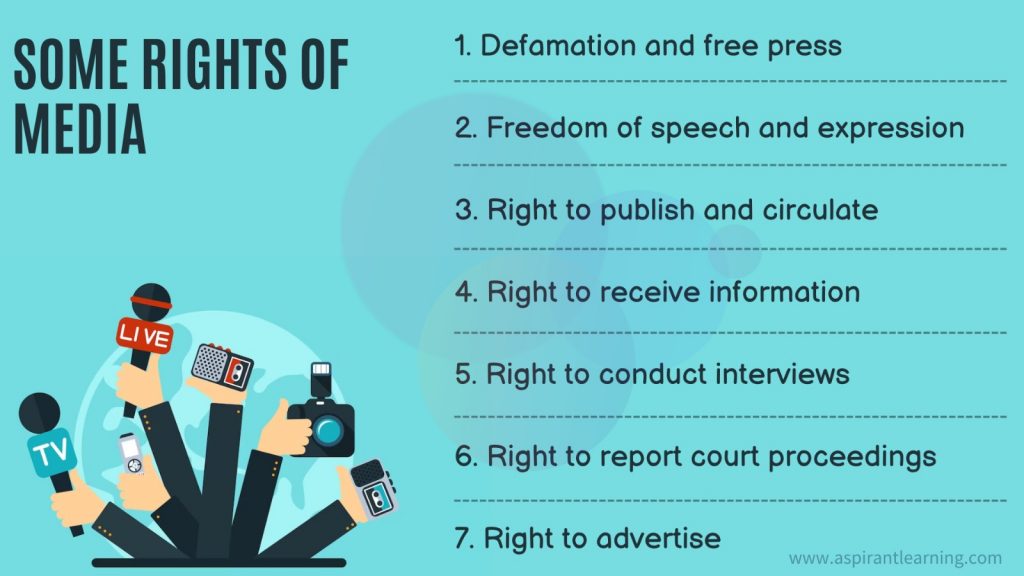News Highlight
The Supreme Court of India strikes a blow for open justice and media freedom.
Key Takeaway
- One example is the Supreme Court’s decision to overturn MediaOne’s refusal of broadcasting authorisation.
- It safeguards the media against arbitrary action and prohibits using unspecified national security concerns as a pretext for shutting down an outlet.
- The Court ruled that the government could not label critical coverage or broadcast critical ideas as “anti-establishment” and commence an action.
- “The usage of such terms implies an assumption that the press must assist the establishment,” it stated.
Freedom of the Press
- About
- The freedom of the press or media refers to the freedom of expression rights provided by the Indian Constitution in Article 19(1)(a).
- It promotes independent media and democracy by allowing citizens to express their support or disagreement with government operations.
- Article 19 came to light after the Romesh Thappar vs State of Madras case highlighted the importance of media as the foundation of all democratic organisations.
- But, it acknowledged ‘public safety and public order’ under Article 9 (1-A) and dismissed the complaint.
- Press and media freedom is highly valued in India.
- Article 19 (2) imposes reasonable restrictions.
- According to Article 19, “Everyone has the right to free opinion and expression.”
- It involves the freedom to freely express oneself and seek, acquire, and impart information and ideas through any medium without respect for borders.
Importance of freedom of the press
- Free exchange of ideas
- The press encourages people to look beyond social conventions and provides a forum to debate ideas.
- As well as opinions that individuals throughout the country should voice.
- Holding the person or body accountable for their actions
- People frequently attempt to conceal their behaviour and resolve a matter without involving the media.
- The press brings such circumstances to light and ensures that justice is served correctly with the general public’s support.
- Voice of the people
- The press serves as a conduit via which the bulk of people’s ideas are written and spoken.
- It focuses on silenced issues and brings to light those that should be discussed.
- The fourth pillar of democracy
- Because the media is an independent body that questions the government.
- It might be considered the fourth pillar of democracy, alongside the judiciary, legislative, and executive branches.
Restrictions on Media
- Article 19(2) imposes some constraints to defend the nation and its integrity.
- The restrictions can be imposed in case of threats against;
- Sovereignty and integrity of India
- Security of the State
- Friendly relations with foreign states
- Public order, decency or morality
- Contempt of court
- Defamation
- Incitement to an offence
Current Status of Press in India
- Intimidation and harassment of journalists
- In India, journalists have faced intimidation, harassment, and physical violence from state and non-state entities.
- This has created a fearful environment, which can lead to self-censorship.
- Six journalists have been killed due to their job as of 2021.
- India is one of the top four countries regarding recorded deaths.
- Legal challenges
- Many prosecutions have been filed against journalists and media organisations for slander or sedition.
- It has the potential to chill free expression.
- Government control
- In India, the government wields considerable power over the media, owing to its control over broadcast frequencies and advertising revenue.
- This can lead to self-censorship by media groups that rely on government funding or assistance.
- Internet shutdowns
- The government is increasingly utilising internet shutdowns to quell dissent and restrict the flow of information.
- This can severely limit journalists’ and media organisations’ ability to report on events and concerns.
- Lack of media literacy
- Many people in India, particularly in rural regions, may be unaware of false news and lack the ability to recognise it.
- As a result, they are vulnerable to being deceived by misleading information.

Conclusion
- The word “media freedom” is frequently used in conjunction with, or as an alternative to, the terms “free speech” or “free expression.”
- Yet, due to the media’s role as a “public watchdog,” media freedom is given special consideration.
- In addition to disseminating information and ideas, it ensures the public’s right to access this information.
- Expression and media freedom are critical pillars of an open and democratic society.
- The freedom to express one’s views and opinions is necessary for democratic political processes to function.
- Nationally, freedom of expression is required for successful governance and, as a result, economic and social progress.
- Individual freedom of expression is critical to everyone’s development, dignity, and fulfilment.
- There can be no democracy or free country without a wide guarantee of the right to free expression, protected by independent courts.
Pic Courtesy: Legal Brackets
Content Source: The Hindu



